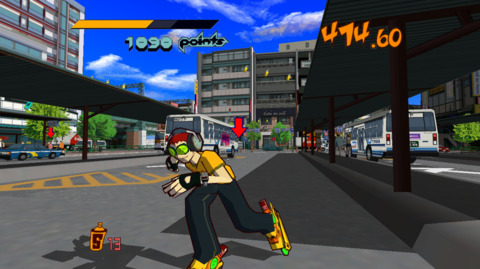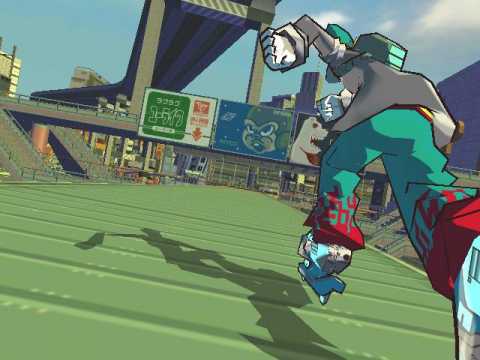Why You're (Probably) Never Seeing Jet Set Radio Future Again
By PistonHyundai 1 Comments

I was always a SEGA guy. Sonic the Hedgehog's vibrant colors, fast and dynamic gameplay, and market-researched persona hooked me in as a dipshit toddler, but what kept me attached to them as I grew into a dipshit adult was how creative they could be. As cynical as Sonic's focus-tested b-boy stance and in-your-face attitude was, they could really go off the beaten path back in the day. While Nintendo was removing blood and religious iconography from games, SEGA was greenlighting roguelikes about rapping aliens, pushing the limits of arcade hardware, and paving the way for our current subscription service nightmare. Their risk-taking probably bit them in the ass more often than not, but they would just go for it in a way that few other companies would, especially during the Dreamcast era, where their first-party lineup achieved peak diversity. Amid games like Space Channel 5, Crazy Taxi, and Phantasy Star Online, there was Jet Set Radio, one of the most memorable games SEGA would ever make. It's got its problems, but it also has a swagger like none other, loaded with bombastic characters, quirky tunes, and a cel-shaded art style that's aged like wine. Even the hectic gameplay really shined once you came to terms with its handling and controls. Thankfully, it's not hard to get a hold of Jet Set Radio these days due to a bevy of modern ports, but its sequel hasn't fared as well.
What About the Future?

There's a bit of a tendency among people to overstate the quality of games that are harder to access. It's true that sometimes one of the rarest games in a series is in fact the best, but a lot of games end up with a reputation that's overblown simply because of the forbidden fruit aspect to playing it well after its release. In SEGA's case, the once seldom-ported Sonic CD was frequently hailed as the secret best game in the series, and while it's pretty great (if nothing else but for its aesthetic), the level design doesn't quite hold up compared to its Genesis brethren. But what about Jet Set Radio Future, the Xbox-exclusive sequel to the Dreamcast original? The Xbox was hardly the place for fans of Japanese games, and the Xbox 360's capabilities of emulating the game leave a lot to be desired, so it's gained this status alongside other SEGA exclusives like Panzer Dragoon Orta as one of the most sought-after Xbox games to never leave the console. While I have a soft spot for the original JSR and ultimately prefer it for its more arcadey single-level structure, JSRF damn sure earned its reputation: the improvements it makes are undeniable. Movement is far less rigid, stringing together combos is buttery smooth thanks to the reworked trick system and the doubled frame rate, and this all goes hand-in-hand with the much more ambitious level design. I might like the original more, but I can accept that I'm in the minority because Jet Set Radio Future remains an outstanding game and one of the best of all-time, which makes it that much more disappointing that it's been so hard to play properly.
This leads us to the big question: Why? Microsoft's pumped-up emulation muscle has been a highlight of the Xbox One's rocky lifespan, and SEGA's been making it a point as of late to make fans happy, so a rerelease or Xbox One backwards compatibility should be a lay-up for these guys. They're practically running out of fanbases to appease: Streets of Rage 4's on the way, ToeJam & Earl's experienced a solid revival, Sonic Mania finally nailed the classic Sonic formula over 20 years since its last truly great game, and they've even shut my mouth on Phantasy Star Online 2, the announced-in-2012 "yeah, but" that would inevitably come up whenever people mentioned anything positive regarding the company. Quite a few dormant franchises still linger in the minds of SEGA fans, but Jet Set Radio Future's been in high demand for way longer than I've been giving them shit for PSO2's disappearance from the West, and they're seemingly in a great position to deliver the goods. So what's the big holdup?
There's no way to know for sure, but odds are that the Beastie Boys messed everything up.
Dark Future
It's probably obvious to some people that music licensing would be the culprit, but JSRF's circumstances are a little unique. You'd think since the original game was able to overcome that hurdle—the 2012 ports, while missing three tracks, went as far as to include music that was exclusive in the US and/or PAL releases for the first time worldwide—that JSRF would be an easy job for SEGA, but the truth is that the game's future prospects were most likely doomed from the start. There aren't actually any Beastie Boys songs on the JSRF soundtrack, but the vast majority of Future's licensed soundtrack was courtesy of a partnership with Grand Royal, a record label founded by the group in the early 90s. They had success throughout the decade thanks to bands like Jimmy Eat World, Atari Teenage Riot, and At the Drive-In, but with mounting debts (in part caused by some of the aforementioned artists disbanding) and the work that went into maintaining the label and its magazine stretching the Beastie Boys thin, the label's closure was announced in the second half of 2001, with its final release being a promotional music sampler for none other than the Jet Set Radio Future soundtrack. The timing couldn't have been worse for JSRF, as the game wasn't even released until early 2002 (a slightly morbid detail: SEGA's own press release celebrating the game's launch included a blurb about the label's closure). Any hope for a future release was shot before the original version even hit store shelves, as Grand Royal's assets—including music rights—were auctioned off after the label shuttered.
Truth be told, licensing much of the game's Grand Royal music in 2019 shouldn't be that difficult: the music ownership's been scattered all over, but many of the songs featured are now property of record labels that are still up and running. Scapegoat Wax's "Aisle 10 (Hello Allison)" is currently being sold digitally by Disney's Hollywood Records (they really do own everything), Bis' "Statement of Intent" is owned by Beggars Group, and Warner Music retains the rights to the grating charm of Cibo Matto's "Birthday Cake." Much of Grand Royal's back catalogue was also purchased by a group of fans who then founded GR2 Records, but the label appears to be dormant (or at the very least silently rebranded as GR Entertainment, as YouTube copyright claims on music they own are all associated with that name). Despite the label closure, many of the game's most iconic songs are covered, but the biggest question mark is the status of the music most closely tied to the Beastie Boys. Many of the game's songs were composed or remixed by the Latch Brothers, a short-lived production group consisting of Beastie Boys member Michael Diamond, Mary's Danish bassist Chris Wagner, and Grand Royal employee Kenny Salcido. Their association with the Beastie Boys (whose music rights were not a part of Grand Royal's auction and were property of GR's parent company, Capitol Records) combined with their relatively low profile—they're mostly known for their JSRF music and never released a record of their own, so you have to consider they may not have officially signed with any label—means the rights to their work remain elusive. This is terrible news for a rerelease, since without the Latch Brothers, the game would lose over a quarter of its soundtrack, with the trio working on eight of the game's thirty tracks. It's possible that Capitol Records owns the missing pieces of the puzzle, but it's likely that only a few know for sure.
It's always possible that SEGA could get in touch with the right people and figure things out, and maybe it's something else entirely keeping us from playing Jet Set Radio Future on a modern console. Hell, it's entirely possible that SEGA just doesn't think it's worth all that money licensing the music and paying people to port the game over, but one way or another, it seems like a new version of Jet Set Radio Future just isn't happening. It's not all bad news, though: the whole reason I decided to throw this blog together was because I recently took a look at the state of Xbox emulation after having played through Jet Set Radio, and the results were astounding. Things are finally, finally coming together, and you can play JSRF start-to-finish on Cxbx-Reloaded, even if your PC isn't the beefiest. It's a fantastic development, but it shouldn't be the only option beyond the original release or the 360's sub-par emulation. Hopefully we'll see the game in a new (official) form some day, but it really feels like that if it was possible, it would've happened by now.
Then again, I was also convinced PSO2 was never coming to the West.
